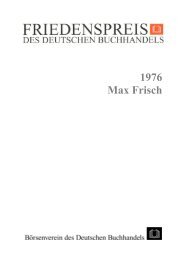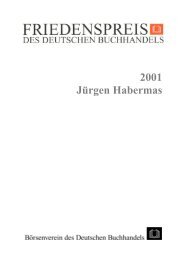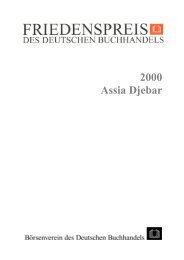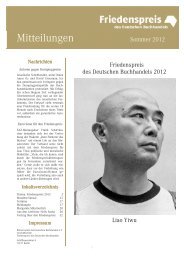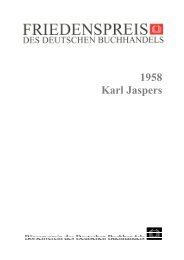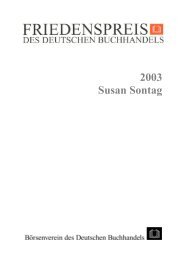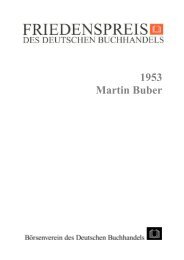2011 Peace Prize speeches - Friedenspreis des Deutschen ...
2011 Peace Prize speeches - Friedenspreis des Deutschen ...
2011 Peace Prize speeches - Friedenspreis des Deutschen ...
You also want an ePaper? Increase the reach of your titles
YUMPU automatically turns print PDFs into web optimized ePapers that Google loves.
<strong>Peace</strong> <strong>Prize</strong> of the German Book Trade <strong>2011</strong><br />
Petra Roth, Lord Major of the City of Frankfurt<br />
Greeting<br />
Ladies and gentlemen, in the name of the<br />
City of Frankfurt am Main, I would like to warmly<br />
welcome you to the awarding of the <strong>2011</strong><br />
<strong>Peace</strong> <strong>Prize</strong> of the German Book Trade to Boualem<br />
Sansal.<br />
In keeping with tradition, we are bestowing<br />
the <strong>Peace</strong> <strong>Prize</strong> here in the Church of St. Paul,<br />
the birthplace of German parliamentarianism<br />
and a location that continues to be a symbol of a<br />
“democratic spring” in Germany. Could there be<br />
a better place to honor Boualem Sansal, the great<br />
Algerian writer and relentless fighter for the<br />
peaceful democratization of his home country?<br />
And could there be a better time to honor him, a<br />
year in which the autocratic rulers of Egypt,<br />
Tunisia and now, as seems likely, also Libya<br />
were disempowered by their own people?<br />
The relief and joy that North Africa’s European<br />
neighbors feel about its democratic awakening<br />
is admittedly great. But, they still have an<br />
equal amount of concern as to whether the<br />
much-touted “Arab Spring” will truly fulfill the<br />
long-term hopes of its peoples. No one knows<br />
this better than Boualem Sansal. As both a writer<br />
and a critic of the system, Sansal has watched<br />
the upheavals in the Arab world with only cautious<br />
optimism. Although heroism of any kind is<br />
foreign to him, he has still called for the end of<br />
Algeria’s authoritarian regime more courageously<br />
than any other. Instead of going into exile, he<br />
continues to live in his multiethnic homeland<br />
even today – <strong>des</strong>pite repression and at the cost<br />
of a sound means of existence. And he is the<br />
4<br />
type of person who worries equally about the<br />
future of the entire region.<br />
In Germany, when a writer triggers an uproar,<br />
he or she quickly becomes a permanent<br />
feature on the talk-show circuit. In other parts of<br />
the world, doing so could mean risking life and<br />
limb. This is precisely why we commemorate the<br />
courage of many authors here in the Church of<br />
St. Paul. Like hardly any other author in the region<br />
between Europe and Africa, Boualem Sansal<br />
embodies a “littérature engagée” that is free of<br />
all ideology and solely committed to human dignity<br />
and the truth. We can also thank him for not<br />
sacrificing what is distant and foreign to a gesture<br />
of false intimacy and blind tolerance, to a<br />
gesture of supposedly “world literature.” Instead,<br />
by capturing the determination and uniqueness<br />
of Northern Africa, he rescues it from becoming<br />
relativized.<br />
We owe it to Boualem Sansal to expressly<br />
thank him for assuming the responsibilities that<br />
come with being a critical intellectual and a<br />
great writer who knows only one authority: the<br />
truth and the universality of human rights.<br />
Dear Boualem Sansal, I congratulate you<br />
warmly on winning the <strong>2011</strong> <strong>Peace</strong> <strong>Prize</strong> of the<br />
German Book Trade.<br />
*




